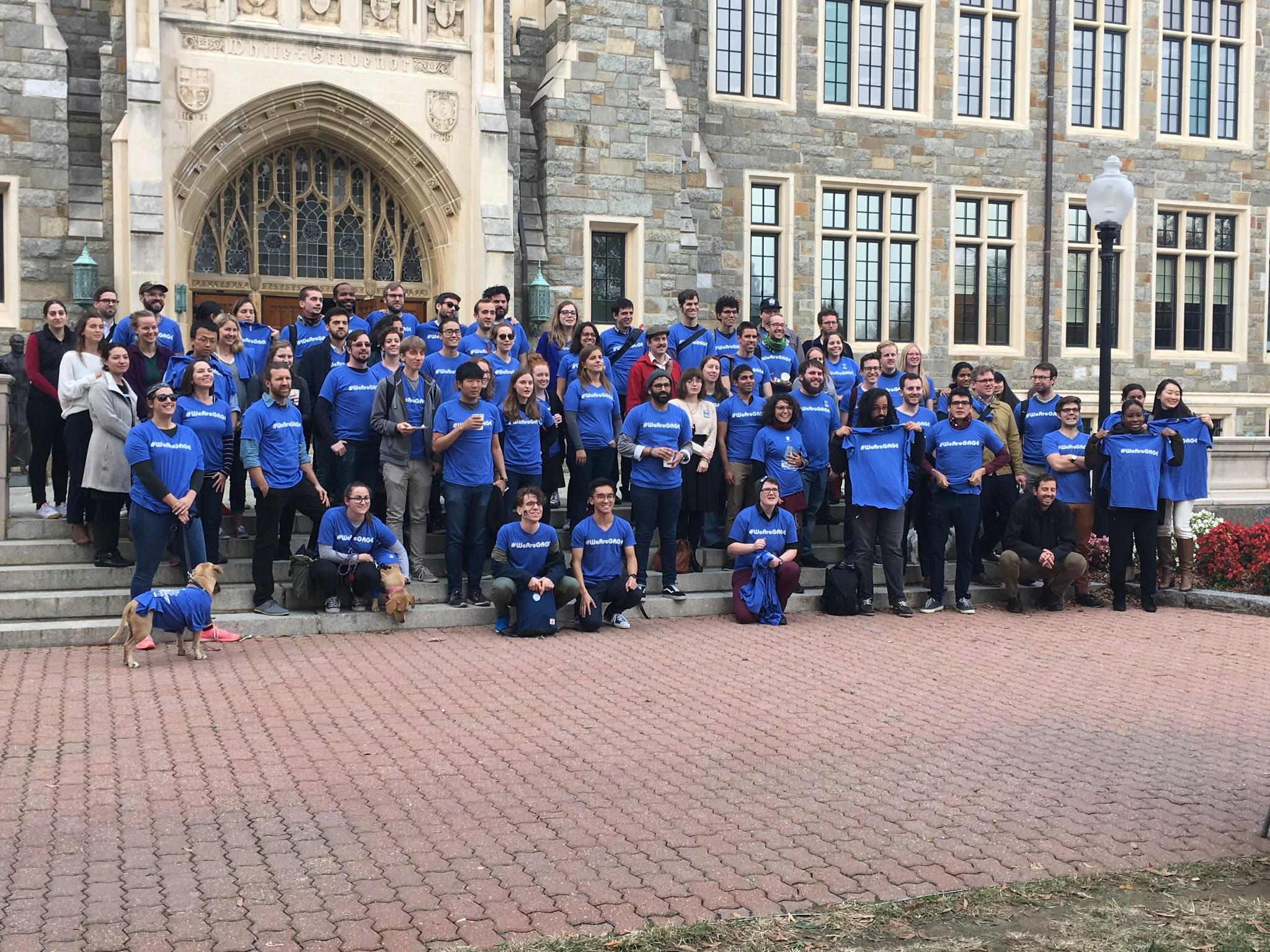The Georgetown Alliance of Graduate Employees (GAGE), the university’s union of graduate students who work for their departments, came one step closer to official recognition from the school on Thursday. University administrators informed GAGE representatives that they are preparing to agree to a union election arbitrated by a third party.
GAGE represents graduate students who work as teaching or research assistants at Georgetown, often as a departmental requirement. The union is affiliated with the American Federation of Teachers, but has not been recognized by the university as a collective bargaining unit.
“This week we began discussions towards the goal of entering into a private election agreement that recognizes that our graduate students’ relationship with the University is fundamentally an educational one, while also responding to some graduate students’ desire to have a stronger voice in our continuing work to create conditions under which they can flourish,” wrote university spokesperson Rachel Pugh in an email to the Voice.
GAGE had proposed an election arbitrated by a third party. Union elections are typically administered by the National Labor Relations Board (NLRB), but GAGE believed that an election arbitrated by a third party would insure greater security for graduate student unions. “Should we hold an election through the NLRB,” wrote Hailey Huget, a member of GAGE, in an email to the Voice, “there is a chance that Georgetown could seek to legally challenge the results of the election after the fact — and, in so doing, end up overturning the 2016 Columbia decision.” In a 2016 case involving Columbia University, the NLRB ruled that graduate students who work for their departments are employees. GAGE requested an election run by the American Arbitration Association, which administered the graduate student election at Cornell University.
The university expressed a commitment to GAGE to respect the results of an election, even if the NLRB reverses its position on graduate students. “Georgetown will respect our rights to vote for a union and, if the graduate workers vote in favor of unionization, collectively bargain a contract even if the NLRB reverses its earlier decision allowing graduate workers to unionize,” the GAGE organizing committee wrote to members in an email.
Organizers have been concerned that the labor board, under increasing pressure from the Trump administration, might reverse its Obama-era decision on graduate students before any unions are actually formed. “A few other universities, despite talking a big game of opposing the Trump administration and stuff, when their grad workers have tried to unionize they use these stall tactics, in the hopes that the administration would overturn our standing as workers,” Karen Rice, a fourth year doctoral student affiliated with GAGE, told the Voice on Dec. 4.
The university’s commitment has come after months of organizing by GAGE. Three months ago, the union asked for voluntary recognition from the university, claiming that over 50 percent of eligible graduate students had indicated their support for a union by signing cards and other documents. The administration declined in a letter, writing that the university’s relationship with graduate students is purely educational, and not one of employer and employee. The letter also expressed doubt that a union with a significant annual change in membership could be a stable bargaining unit.
The university has since emphasized that it has never voluntarily recognized unions that have only shown support through signed cards and forms. “All of Georgetown’s unions were selected through NLRB elections, which provide for a secret ballot and strict procedures to ensure that there is no employer or union coercion of voters,” a university webpage on unionization reads.
The university also said in the letter that the Georgetown Just Employment Policy, which assures that the administration will respect the right to unionize, does not apply to graduate students. In response, a majority of the Advisory Committee on Business Practices, which directs the university on the Just Employment Policy, resigned. The resigning members included three professors, three undergraduate students, and one staff member from the Kalmanovitz Initiative.
GAGE had been organizing this week to demand a response from administrators. “This latest announcement from the administration comes after a week of action in which graduate workers, together with alumni, undergraduates, university faculty and staff, and allies from the DC labor community, united to demand that President DeGioia live up to Georgetown’s values as a Catholic and Jesuit institution and respect the rights of graduate workers to unionize,” the organizing committee email reads. Organizers called and emailed the president’s office repeatedly, while planning an ironic awards ceremony for the administration outside the alumni association’s annual service recognition awards. After the commitment was given, GAGE cancelled the event.
“We have seen that the administration responds to collective action from us and from our supporters in the wider Georgetown and DC community,” GAGE wrote on its website. “Organizing works.”







[…] “University Begins Negotiating Union Election For Grad Students” [Georgetown Voice]. […]
[…] “University Begins Negotiating Union Election For Grad Students” [Georgetown Voice]. […]